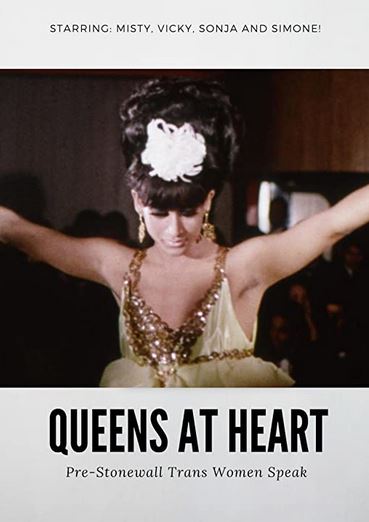Release Year: 2006
Synopsis:
With the dramatic competition to win the crown and a starring role in a controversial new Vegas Revue as a high-stakes backdrop, TRANTASIA explores the intensely private and moving stories of its extraordinary contestants.
Told through provocative hometown profiles and heartbreaking one-on-one interviews, the groundbreaking film documents the sometimes humorous, always personal journeys of these true survivors. United by common histories of hardship and persecution, their ultimate triumph is a moving celebration of the human spirit. Pushing the gender-bending envelope with a funny, profoundly touching and thoroughly entertaining sensibility, TRANTASIA combines the intense drama of this one-of-a-kind contest with unforgettable, over-the-top characters competing for fame and fortune in Sin City.
Trantasia, directed by Jeremy Stanford, is a groundbreaking documentary that explores the lives and experiences of transgender individuals, particularly focusing on the journey of a group of participants in a unique beauty pageant. The film provides an intimate look at the challenges, triumphs, and transformations faced by those within the transgender community. Through compelling storytelling and striking visuals, Stanford captures the essence of identity, self-acceptance, and the pursuit of authenticity.
At the heart of Trantasia is the Miss Transgender pageant, an event that celebrates the beauty, resilience, and individuality of transgender women. Stanford's film goes beyond the surface of a beauty competition; it delves into the personal stories of contestants, highlighting their diverse backgrounds and the myriad experiences that shape their identities. The title itself, a blend of "transgender" and "fantasia," suggests a dreamlike exploration of self-expression and transformation.
The documentary features a range of participants, each with their own narrative. From struggles with acceptance and discrimination to journeys of self-discovery and empowerment, the film showcases the varied experiences within the transgender community. Viewers meet individuals like: Lola: A contestant whose story reflects the pain of societal rejection and the joy of finding a supportive community.
Talia: A former beauty queen who shares her experiences navigating life before and after her transition, emphasizing the importance of self-love.
Jasmine: A young trans woman who, through her participation in the pageant, seeks to inspire others to embrace their true selves. In addition, we can follow such contestants as Mimi Marks, Nikki Exotika, Tiara Russell, Alecia Cienega, Dorae Saunders, Jahna Steele, Maria Roman, Ruby Kay, Kristina Marie, Cassandra Cass, Erica Andrews, and Katella Dash. These narratives are woven together, creating a rich tapestry that illustrates the complexity of transgender identity.
One of the central themes of Trantasia is the quest for acceptance—both self-acceptance and acceptance from society. Many contestants share their experiences with familial rejection, societal prejudice, and the challenges of finding a place in a world that often marginalizes them. However, the film also highlights moments of empowerment as contestants come together, forming a supportive network that fosters resilience. Stanford expertly balances the weight of these struggles with uplifting moments of joy and triumph. The pageant serves not only as a platform for self-expression but also as a celebration of diversity and beauty in all its forms. The camaraderie among the contestants becomes a source of strength, illustrating the power of community in overcoming adversity.
Trantasia invites viewers to reconsider the concept of beauty pageants themselves. While some may view these competitions as superficial, the film presents them as spaces for personal growth and expression. The pageant becomes a stage for participants to assert their identities and reclaim their narratives, challenging conventional notions of beauty and femininity. The film also addresses the impact of media representations on the transgender community. By showcasing the diverse experiences of the contestants, Trantasia works to dismantle stereotypes and promote a more nuanced understanding of transgender lives.
Stanford employs a range of cinematic techniques to enhance the emotional depth of the documentary. The use of intimate interviews allows for raw and honest reflections from the contestants, drawing viewers into their personal journeys. Cinematic visuals, including vibrant pageant performances and candid moments of preparation, create a dynamic viewing experience that captures both the glamour and the grit of the contestants’ lives. The score and sound design further amplify the emotional resonance, complementing the visuals with a powerful auditory backdrop that reflects the highs and lows of the participants’ experiences.
Trantasia is more than just a documentary; it is a poignant exploration of identity, resilience, and the quest for belonging. Jeremy Stanford's work encourages viewers to engage with the complexities of transgender experiences, fostering empathy and understanding in a world that often struggles to accept differences. By humanizing the stories of the contestants, Trantasia challenges societal norms and invites conversations about gender identity and expression. As audiences witness the beauty and strength of the participants, they are reminded of the importance of authenticity and the universal desire for acceptance. In a world where the narratives surrounding transgender individuals are frequently dominated by negativity and misunderstanding, Trantasia stands out as a beacon of hope and celebration, proving that every journey toward self-acceptance is a beautiful and worthy one.
via: imdb.com
Image credits: YouTube
My interview with Maria Roman: Heroines of My Life
























Post a Comment